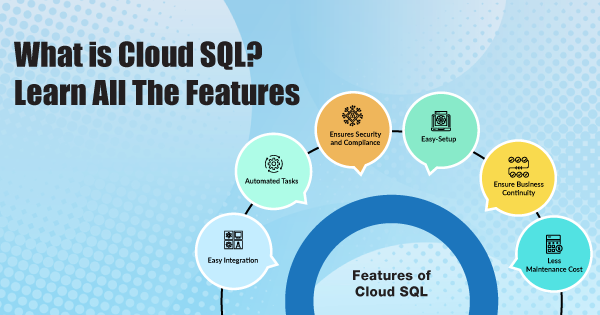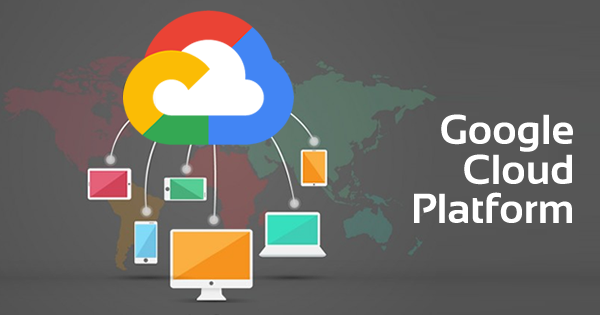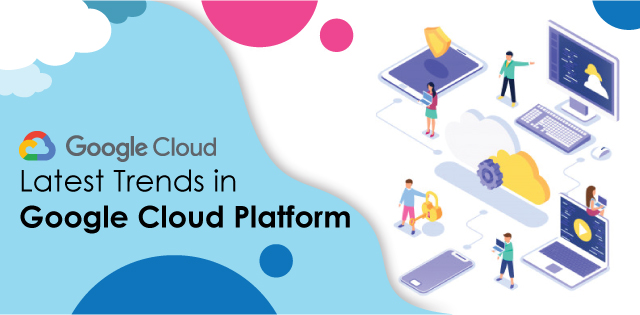Cloud SQL is a database service that is embedded with fully managed architecture. Its potential is to help set up & regulate all of the relational databases over Google Cloud. It embeds flexibility upon setting up database infrastructure after the application development aspects. In case you have databases that are being carried out within MySQL, PostgreSQL BETA, or SQL Server, you can conveniently consider shifting it onto Cloud SQL.
The businesses pay a considerable fee to Google Cloud to gain access to this database infrastructure potential. Cloud SQL takes the responsibility of managing databases with services such as migration, patching, and backup & recovery. Holding onto the database service, the business gets the ease of focusing upon collaboration and productivity while scaling the applications.
Read more about Introduction to Cloud Computing!
Hence, this article intends to help you learn the details associated with the functionality of Cloud SQL and its features. So, hold onto this article till the end to brush up on your knowledge about Cloud SQL’s potential.
Working Overview of Cloud SQL
A relational database within Cloud SQL has the potential of storing related data on priority. The establishment of the database represents tables and rows that consist of interrelated data items. The associated characteristics of the relational database within Cloud SQL include SQL & Data Integrity.
Structured Query Language (SQL) is termed to be the primary interface that builds communication with all of the relational databases. Hence, it is important for use upon adding, updating, deleting, and extracting subsets of data whenever required. Data integrity, on the other hand, ensures balance upon accuracy, completeness, and consistency of data.
Interested in Google Cloud Certifications? Check out whizlabs online courses, practice tests and free tests here!
Google Cloud SQL supports both fully-managed as well as relational database infrastructure. The compatibility of Cloud SQL with relational database infrastructure revolves around three engines, which include MySQL by Oracle, PostgreSQL by Global Development Group, and SQL Server by Microsoft. Along with offering support and compatibility, Cloud SQL can also be a preferable alternative to all of these relational database engines.
In case you intend to spend less time on managing the database and spend more of that time upon using it. Most of the applications that are running over App Engine, Compute Engine, and other Google Cloud services make use of Cloud SQL on priority to seek database storage.
Cloud SQL offers quite a lot of services to ensure that you do not have to build your database infrastructure and manage it, all on your own. You can direct your attention and focus towards Cloud SQL and handle the necessary operations. Cloud SQL looks after network connectivity, high availability, backups, failovers, import & export, monitoring, logging, maintenance, and updates.
All of these services altogether make Cloud SQL a considerable database management service of Google Cloud. But, you should keep in mind that Cloud SQL is not a database administration service or tool. It is because the administration tool for the database serves a different purpose.
Check out Google Cloud SQL-Deep Dive Certification!
The business continuity is assured with the integration of Cloud SQL, with secure and reliable services that are backed by an SRE team 24/7. The database provisioning aspects are automated to help save more time during operations. Apart from that, storage capacity management can also be automated to increase the capacity whenever there is a need.
The developers with Cloud SQL insights are finding it easy to carry out database observability. Cloud SQL offers easy integration upon Google Cloud Services such as BigQuery or GKE and other applications for enhanced operations.
For connecting with the Google Cloud SQL sequences or instances, you can possibly make use of:
- Google Apps Script
- MySQL Client
- SQL Workbench
- Toad- For MySQL
- App Engine- Java Apps, Python Apps
- External Applications- The apps that make use of standard MySQL database drivers.
Google Cloud SQL Pricing
The pricing of Google Cloud SQL depends upon the instance type you choose, amongst SQL Server, MySQL and PostgreSQL. The pricing for MySQL & PostgreSQL consists of certain charges that are included within the final bill. The charges are CPU and Memory pricing, Storage & Networking Pricing, and Instance Pricing.
The CPU and memory pricing for MySQL and PostgreSQL instances are:
- vCPUs have charges of $0.0413/vCPU/hour. For one year commitment, you will have to pay $0.03098 per vCPU per hour. And for a 3-year commitment, you will have to pay $0.01982 per vCPU per hour.
- Memory has charges of $0.0070 per GB per hour. But with a one-year commitment, you will have to pay just $0.00525 per GB per hour. If you are taking up a 3-year commitment, then the pricing will be $0.00336 per GB per hour.
- HA vCPUs have charges, $0.0826 per vCPU per hour in general. With a 1 year commitment, you will have to pay $0.06195 per vCPU per hour, and for a 3-year commitment, you will have to pay $0.03965 per vCPU per hour.
- HA Memory charges are $0.0140 per GB per hour. With a 1 year commitment, you need to pay only $0.01050 per GB per hour, and with a 3-year commitment, you will have to pay $0.00672 per GB per hour.
The storage and networking pricing for MySQL and PostgreSQL instances are:
- Storage pricing includes $0.170 per GB/month for SSD storage, $0.0.90 per GB/month for HDD storage, and $0.80 per GB/month for the backups.
- HA Storage pricing includes $0.340 per GB/month for the SSD storage, $0.180 for the HDD storage, and $0.080 per GB/month for the backups.
- For serverless export, you do not have to pay any charges until 1st February 2022. But after that, you will have to pay $0.01/GB upon the instance storage capacity.
- Network ingress to cloud SQL is free.
If you intend to know more details and an in-depth breakdown of pricing for CloudSQL, then you can refer to this official pricing documentation by Google for the same.
Functionality Features of Google Cloud SQL
To help you better understand the potential of Cloud SQL, it is important for you to get an idea of the core features of Cloud SQL. The features as specified by Google are Cloud SQL for MySQL, Cloud SQL for PostgreSQL, and Cloud SQL for SQL Server.
1. Cloud SQL for MySQL
- The Cloud SQL instances are compatible with the MySQL versions 8.0, 5.7, and 5.6; It offers up to 624 GB RAM and around 64TB of storage space for data. There is an integrated option for an automatic increase of adequate storage size, as per necessity.
- Cloud SQL allows creation and management of the instances with Google Cloud console. The instances can be made available in the EU, Asia, Australia, and America.
- You get support for implementing secure external connections within Cloud SQL Auth proxy or with TLS/SSL protocol.
- Cloud SQL for MySQL offers support for private services access or private IP.
- Cloud SQL offers the potential of data replication between diverse zones, embedded with the feature, automatic failover, for MySQL.
- Cloud SQL for MySQL offers on-demand & automated back-ups or recovery based upon point-in-time.
- The developers get support for instance-cloning as well. Moreover, CloudSQL for MySQL also allows integration with the other cloud operations for monitoring and logging aspects.
- Cloud SQL offers support for the wire protocol of MySQL and the standard connectors of MySQL.
- You can make use of Cloud SQL, for MySQL, with the applications built over App engine that is running over the flexible environment, and are written with C#, Java, Go, PHP, Node.js, Ruby, and Python.
- You can also use Cloud SQL, for MySQL, with the apps built over external platforms, by implementing the standard MySQL protocol.
- The customers’ data is encrypted over internal networks of Google and within the database tablets, backups, and temporary files.
- Instance cloning is a prominent feature of Cloud SQL.
2. Cloud SQL for PostgreSQL
Most of the features are the same as that of CloudSQL for MySQL. It is because Google CloudSQL integrations replicate the same services to all relational database engines. But, even though all of the features of Cloud SQL for PostgreSQL are mostly same as that of CloudSQL for MySQL, but there are certain inclusive features that are highlighted below:
- You will get fully managed databases within PostgreSQL over Google Cloud.
- You can go for custom types of machines that might have specifications up to 96CPUs and 624GB of RAM.
- The available storage range is up to 64TB. And you get the ability to enable automatic increase of storage size, as per the necessity.
- Cloud SQL offers support for standard PostgreSQL connectors and client-server protocol.
- Cloud SQL for PostgreSQL supports several extensions for this relational database engine. If you intend to check out the entire list of PostgreSQL extensions, you can refer to this link!
- Cloud SQL for PostgreSQL supports SQL procedural language or PL/pgSQL language. You can make use of Cloud SQL for PostgreSQL, with the applications built over App Engine that is written in the language Node.js, Python, Java, Go, C#, and Ruby.
3. Cloud SQL for SQL Server
Just like Cloud SQL for PostgreSQL and MySQL, there are many common features within Cloud SQL for SQL Server considerations. Therefore, it is important for you to get exposure to only the additional ones to get a better understanding of Cloud SQL for SQL Server. The features include:
- Cloud SQL for SQL Server allows integration upon the Stackdriver monitoring and logging.
- The SQL Server Agent is enabled within Cloud SQL for facilitating replication and other important jobs. Data replication between multiple regions is possible within Cloud SQL for SQL Server.
- You can set any default collation for the databases while you intend to create an instance.
- It offers integration of managed service for the Microsoft Active Directory, with the help of Windows Authentication.
- You get intelligent query processing, accelerated database recovery, enhanced data classification, enhanced monitoring, and Change Data Capture (CDC) features within Cloud SQL for SQL Server.
- You get the potential to import the databases with the help of SQL and BAK files.
- You can also export databases with the help of BAK files.
- Cloud SQL for SQL Server supports the Transact SQL Syntax.
- You can connect onto the Cloud SQL instance for the SQL Server with the help of SQL Server Management Studio, sqlcmd utility, or a client.
Perks of Turning up to Google Cloud SQL
As you are now aware of the true potential and efficacy of Google Cloud SQL, it is important for you to get an idea of the perks that you get upon investing in this database service. These benefits are tallied, depending upon the proactive reviews from users and developers across the globe. The perks or benefits of Google Cloud SQL include:
1. Business Continuity
CloudSQL ensures that you possess data backup and data recovery potential. It will help you retrieve the data of your application seamlessly, in times of disaster or data loss, to carry on with the operations without any obstacles.
2. Security & Compliance
Firewall protection and data encryption are standard with Cloud SQL. It is an RDBMS secure database service that enhances its focus upon private connectivity through user-controlled network access and authentication.
3. Task Automations
Storage management, redundancy management, capacity management, undergoing updates, and data access services can be automated under Cloud SQL database service.
4. Convenient Setup
There are certain standardized connection drivers and various migration tools to allow you to set up your database app over Google in just a matter of a few minutes. It is a convenience of understandability and integration for beginners!
5. Seamless Integration and Accessibility
Google offers seamless access to the Cloud SQL sequences and instances. It is to ensure effortless integration with App Engine, Compute Engine, and Kubernetes Engine. Hence, this integration will bring in possibilities to enhance analytics and allows you to make SQL queries to databases with the use of BigQuery.
Final Words
Cloud SQL will make your database management aspects easy and convenient. You can create, edit, delete and restart the Cloud SQL sequences based upon your diverse requirements. Not just that, but you can also use the SSL protocol for connecting to Cloud SQL instances through the SSL.
In case you are an owner of the project, then you can also add some members and give them accessibility to manage the Cloud SQL instances that you have created. You can do it with the help of Google Cloud SDK or Developers Console! So, if you intend to integrate Cloud SQL, then get your hands on it, and attain practical experiences!
- Cloud DNS – A Complete Guide - December 15, 2021
- Google Compute Engine: Features and Advantages - December 14, 2021
- What is Cloud Run? - December 13, 2021
- What is Cloud Load Balancing? A Complete Guide - December 9, 2021
- What is a BigTable? - December 8, 2021
- Docker Image creation – Everything You Should Know! - November 25, 2021
- What is BigQuery? - November 19, 2021
- Docker Architecture in Detail - October 6, 2021



